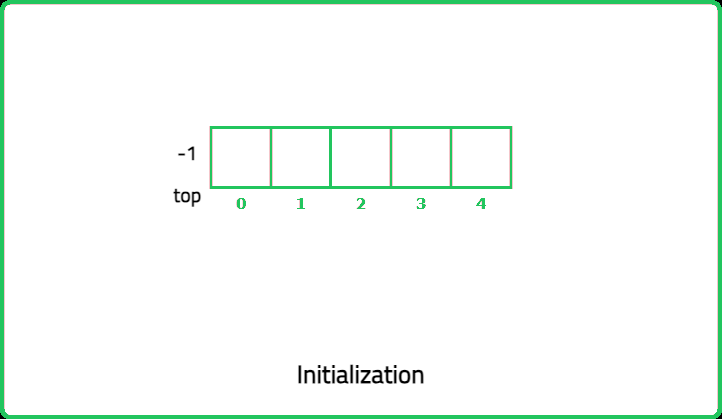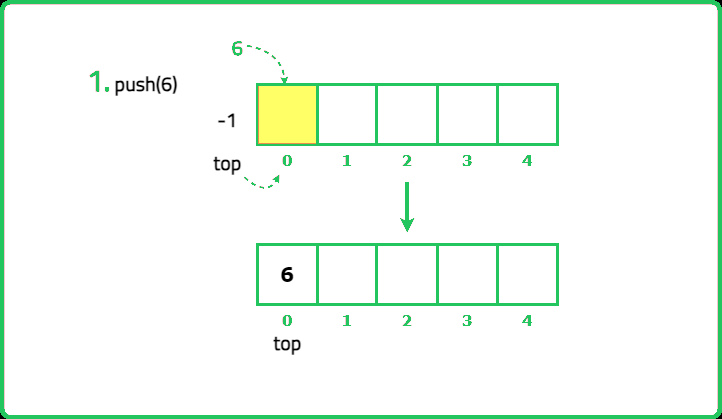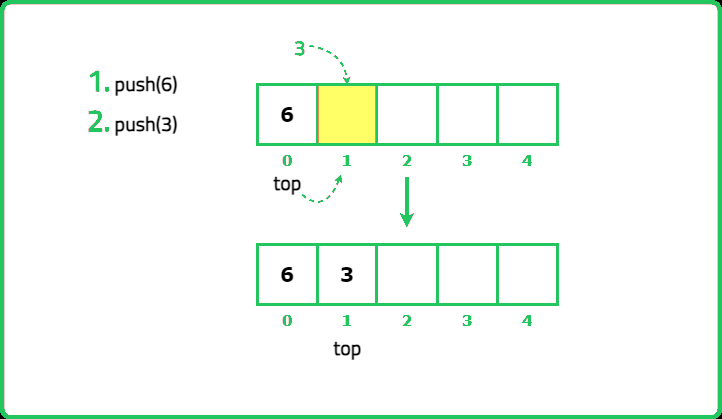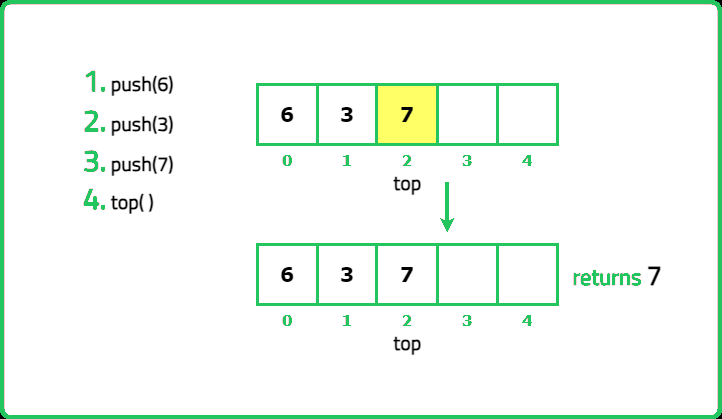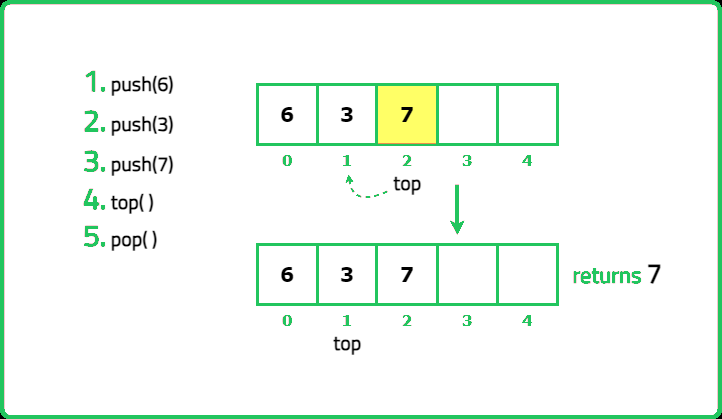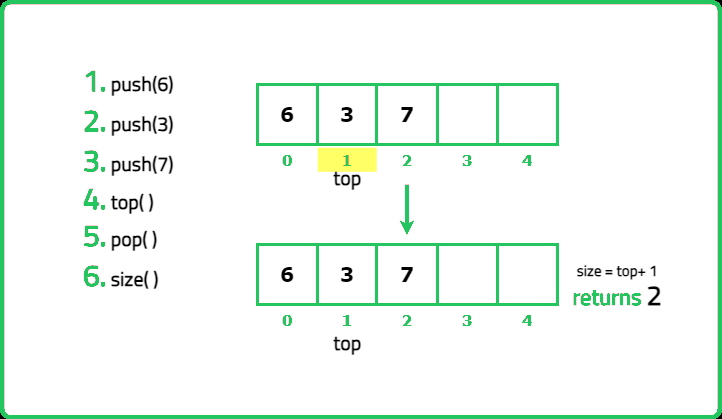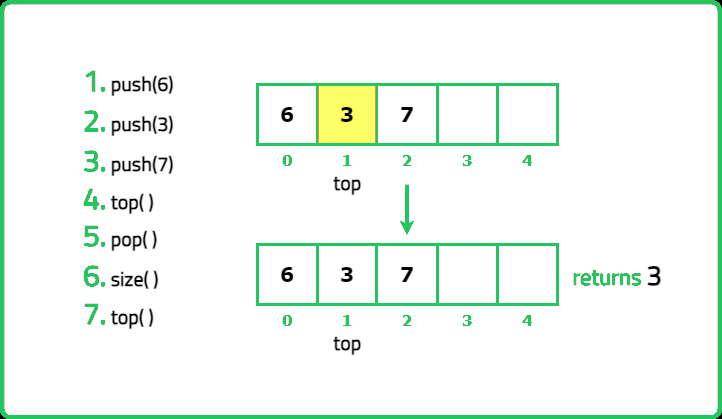12345678910111213141516171819202122232425262728293031323334353637383940414243444546474849505152535455565758596061626364656667686970717273747576777879808182838485
#include <bits/stdc++.h>
using namespace std;
class ArrayStack {
private:
// Array to hold elements
int* stackArray;
// Maximum capacity
int capacity;
// Index of top element
int topIndex;
public:
// Constructor
ArrayStack(int size = 1000) {
capacity = size;
stackArray = new int[capacity];
// Initialize stack as empty
topIndex = -1;
}
// Destructor
~ArrayStack() {
delete[] stackArray;
}
// Pushes element x
void push(int x) {
if (topIndex >= capacity - 1) {
cout << "Stack overflow" << endl;
return;
}
stackArray[++topIndex] = x;
}
// Removes and returns top element
int pop() {
if (isEmpty()) {
cout << "Stack is empty" << endl;
// Return invalid value
return -1;
}
return stackArray[topIndex--];
}
// Returns top element
int top() {
if (isEmpty()) {
cout << "Stack is empty" << endl;
return -1;
}
return stackArray[topIndex];
}
/* Returns true if the
stack is empty, false otherwise*/
bool isEmpty() {
return topIndex == -1;
}
};
// Main Function
int main() {
ArrayStack stack;
vector<string> commands = {"ArrayStack", "push", "push", "top", "pop", "isEmpty"};
vector<vector<int>> inputs = {{}, {5}, {10}, {}, {}, {}};
for (size_t i = 0; i < commands.size(); ++i) {
if (commands[i] == "push") {
stack.push(inputs[i][0]);
cout << "null ";
} else if (commands[i] == "pop") {
cout << stack.pop() << " ";
} else if (commands[i] == "top") {
cout << stack.top() << " ";
} else if (commands[i] == "isEmpty") {
cout << (stack.isEmpty() ? "true" : "false") << " ";
} else if (commands[i] == "ArrayStack") {
cout << "null ";
}
}
return 0;
}
12345678910111213141516171819202122232425262728293031323334353637383940414243444546474849505152535455565758596061626364656667686970717273747576777879808182838485
import java.util.*;
class ArrayStack {
// Array to hold elements
private int[] stackArray;
// Maximum capacity
private int capacity;
// Index of top element
private int topIndex;
// Constructor
public ArrayStack(int size) {
capacity = size;
stackArray = new int[capacity];
// Initialize stack as empty
topIndex = -1;
}
public ArrayStack() {
this(1000);
}
// Pushes element x
public void push(int x) {
if (topIndex >= capacity - 1) {
System.out.println("Stack overflow");
return;
}
stackArray[++topIndex] = x;
}
// Removes and returns top element
public int pop() {
if (isEmpty()) {
System.out.println("Stack is empty");
// Return invalid value
return -1;
}
return stackArray[topIndex--];
}
// Returns top element
public int top() {
if (isEmpty()) {
System.out.println("Stack is empty");
return -1;
}
return stackArray[topIndex];
}
/* Returns true if the
stack is empty, false otherwise */
public boolean isEmpty() {
return topIndex == -1;
}
// Main function
public static void main(String[] args) {
ArrayStack stack = new ArrayStack();
List<String> commands = Arrays.asList("ArrayStack", "push", "push", "top", "pop", "isEmpty");
List<List<Integer>> inputs = Arrays.asList(Arrays.asList(), Arrays.asList(5), Arrays.asList(10), Arrays.asList(), Arrays.asList(), Arrays.asList());
for (int i = 0; i < commands.size(); ++i) {
switch (commands.get(i)) {
case "push":
stack.push(inputs.get(i).get(0));
System.out.print("null ");
break;
case "pop":
System.out.print(stack.pop() + " ");
break;
case "top":
System.out.print(stack.top() + " ");
break;
case "isEmpty":
System.out.print((stack.isEmpty() ? "true" : "false") + " ");
break;
case "ArrayStack":
System.out.print("null ");
break;
}
}
}
}
1234567891011121314151617181920212223242526272829303132333435363738394041424344454647484950515253545556575859
class ArrayStack:
# Constructor
def __init__(self, size=1000):
# Array to hold elements
self.stackArray = [0] * size
# Maximum capacity
self.capacity = size
# Initialize stack as empty
self.topIndex = -1
# Pushes element x
def push(self, x):
if self.topIndex >= self.capacity - 1:
print("Stack overflow")
return
self.topIndex += 1
self.stackArray[self.topIndex] = x
# Removes and returns top element
def pop(self):
if self.isEmpty():
print("Stack is empty")
# Return invalid value
return -1
top_element = self.stackArray[self.topIndex]
self.topIndex -= 1
return top_element
# Returns top element
def top(self):
if self.isEmpty():
print("Stack is empty")
return -1
return self.stackArray[self.topIndex]
'''Returns true if the
stack is empty, false otherwise'''
def isEmpty(self):
return self.topIndex == -1
# Main function
if __name__ == "__main__":
stack = ArrayStack()
commands = ["ArrayStack", "push", "push", "top", "pop", "isEmpty"]
inputs = [[], [5], [10], [], [], []]
for i in range(len(commands)):
if commands[i] == "push":
stack.push(inputs[i][0])
print("null", end=" ")
elif commands[i] == "pop":
print(stack.pop(), end=" ")
elif commands[i] == "top":
print(stack.top(), end=" ")
elif commands[i] == "isEmpty":
print("true" if stack.isEmpty() else "false", end=" ")
elif commands[i] == "ArrayStack":
print("null", end=" ")
123456789101112131415161718192021222324252627282930313233343536373839404142434445464748495051525354555657585960616263646566676869707172
class ArrayStack {
// Constructor
constructor(size = 1000) {
// Array to hold elements
this.stackArray = new Array(size);
// Maximum capacity
this.capacity = size;
// Index of top element
this.topIndex = -1; // Initialize stack as empty
}
// Pushes element x
push(x) {
if (this.topIndex >= this.capacity - 1) {
console.log("Stack overflow");
return;
}
this.stackArray[++this.topIndex] = x;
}
// Removes and returns top element
pop() {
if (this.isEmpty()) {
console.log("Stack is empty");
// Return invalid value
return -1;
}
return this.stackArray[this.topIndex--];
}
// Returns top element
top() {
if (this.isEmpty()) {
console.log("Stack is empty");
return -1;
}
return this.stackArray[this.topIndex];
}
/* Returns true if the
stack is empty, false otherwise */
isEmpty() {
return this.topIndex === -1;
}
}
// Main function
const stack = new ArrayStack();
const commands = ["ArrayStack", "push", "push", "top", "pop", "isEmpty"];
const inputs = [[], [5], [10], [], [], []];
for (let i = 0; i < commands.length; ++i) {
switch (commands[i]) {
case "push":
stack.push(inputs[i][0]);
console.log("null");
break;
case "pop":
console.log(stack.pop());
break;
case "top":
console.log(stack.top());
break;
case "isEmpty":
console.log(stack.isEmpty() ? "true" : "false");
break;
case "ArrayStack":
console.log("null");
break;
}
}
